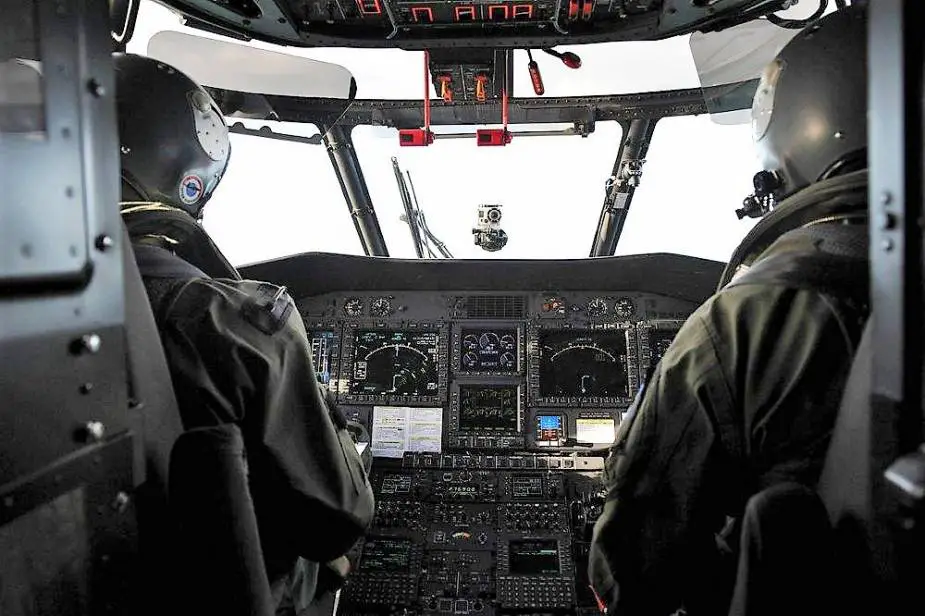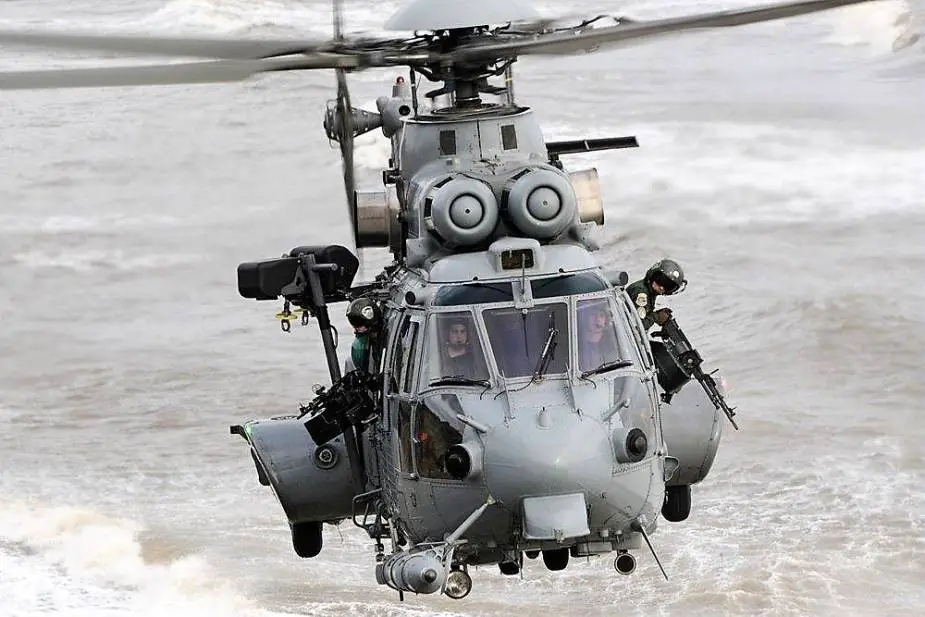Zarvan
ELITE MEMBER

- Joined
- Apr 28, 2011
- Messages
- 54,470
- Reaction score
- 87
- Country
- Location
According to APDR, the Royal Thai Air Force (RTAF) has taken delivery of four new Airbus H225M multirole utility helicopters. With these latest deliveries, the RTAF’s fleet totals 12 H225Ms under its fleet modernization program. These four helicopters will join the air force’s fleet for combat search and rescue, search and rescue flights and troop transport missions.
Follow Air Recognition on Google News at this link

Airbus H225M delivered to the Royal Thai Air Force (Picture source: Airbus Helicopters)
As the most advanced member of Airbus’ military Super Puma/Cougar family, the 11-metric-tonne H225M has proven its reliability and durability in combat conditions and crisis areas that include Lebanon, Afghanistan, Chad, the Ivory Coast, the Central African Republic, Somalia, and Mali, while also supporting NATO-led operations in Libya. The H225M is relied upon as a force multiplier by France, Brazil, Mexico, Malaysia, Indonesia, Kuwait, Singapore and Thailand. The H225M rotorcraft in service around the world have accumulated more than 140,000 flight hours as of 2021
The helicopter’s outstanding 700 NM range can be extended with air-to-air or hover in-flight refueling capabilities. Powered by two powerful Makila 2A1 engines, the H225M’s five-blade rotor provides an exceptionally low vibration level, and the modular Spheriflex design of rotor mechanical assemblies allows for lower maintenance.
The H225M is equipped with avionics and communication systems that reduce crew workload while enhancing mission capability and safety. Airbus has incorporated significant advances in terms of the human-machine interface, ensuring pilots have access to the most important information for the most effective decision-making.
The H225M’s four-axis dual-duplex automatic flight control system (AFCS) provides outstanding precision and stability; its upper modes integrate the engine limitations in all-engines operative (AEO) and one-engine inoperative (OEI) situations. The AFCS also includes SAR flight patterns, instrument flight rules (IFR) procedures, and automatic approaches – and also allows for fully automatic hovering, whatever the speed.
At a glance, the flight crew has access to all navigation and piloting data through the new glass cockpit featuring four 10”x 8-inch enlarged displays, as well as ground proximity, traffic collision avoidance, while such information as electronic warfare indications and alerts are displayed automatically only when necessary.
An enhanced control cursor unit reinforces the interactivity between moving maps and the fight management system. This enhanced configuration enables reduced crew workload with easier, faster and streamlined mission management (route preparation/modification/selection, digital map/navigation management).
The dual flight management system offers better crew mission efficiency by providing more flexible task segregation between the pilot and mission commander.
INS and GPS (integrated navigation system and Global Positioning System) sensor redundancy enhance discrepancy management while providing a higher position accuracy.

Airbus H225M cockpit (Picture source: Airbus Helicopters)
Survivability
Using the proven military heritage of Airbus’ Puma and Super Puma rotorcraft, the H225M was designed from the start for high survivability. Its airframe has reinforced structural mainframes and is equipped with high-energy-absorbing landing gear, along with self-sealing and crashworthy fuel tanks.
Cockpit protection is provided by armored and energy-absorbing crew seats, while the cabin can be equipped with armor plating in the floors and walls, or fitted with armor-plated carpets. The rotor blades’ multi-box construction enhances their resistance to bullet impacts.
Contributing to the H225M’s survivability are a radar warning receiver, missile approach warning system, laser warning receiver and chaff/flare dispensers. The engine exhausts can be fitted with infrared suppressors, while protection against sand and ice is provided by inlet design and multi-purpose air intakes.
Armament
As with Airbus’ H145M and H125M, the H225M can be equipped with HForce, an armament system. Four different packages offer customers a choice of armament to expand the capability of the aircraft from that of ballistic weapons to the use of guided ammunition with firing through the electro-optical system (EOS) or helmet-mounted sight display (HMSD).
Easy maintenance
From home base to the most remote locations, Airbus conceived the H225M with maintainability in mind.
The Safran Makila 2A1 turboshaft engines are of modular design for easy maintenance, and Airbus’ Spheriflex® fiberglass main rotor head is easy to adjust. The airframe includes a built-in step to access the engines.
Overall maintenance information is provided through the integrated health and usage monitoring system (HUMS).

Four different packages offer a choice of armament to expand the capability of the aircraft from that of ballistic weapons to the use of guided ammunition with firing through the electro-optical system (EOS) or helmet-mounted sight display (HMSD). (Picture source: Airbus Helicopters)
Royal Thai Air Force takes delivery of four new Airbus H225M helicopters (airrecognition.com)
Follow Air Recognition on Google News at this link

Airbus H225M delivered to the Royal Thai Air Force (Picture source: Airbus Helicopters)
As the most advanced member of Airbus’ military Super Puma/Cougar family, the 11-metric-tonne H225M has proven its reliability and durability in combat conditions and crisis areas that include Lebanon, Afghanistan, Chad, the Ivory Coast, the Central African Republic, Somalia, and Mali, while also supporting NATO-led operations in Libya. The H225M is relied upon as a force multiplier by France, Brazil, Mexico, Malaysia, Indonesia, Kuwait, Singapore and Thailand. The H225M rotorcraft in service around the world have accumulated more than 140,000 flight hours as of 2021
The helicopter’s outstanding 700 NM range can be extended with air-to-air or hover in-flight refueling capabilities. Powered by two powerful Makila 2A1 engines, the H225M’s five-blade rotor provides an exceptionally low vibration level, and the modular Spheriflex design of rotor mechanical assemblies allows for lower maintenance.
The H225M is equipped with avionics and communication systems that reduce crew workload while enhancing mission capability and safety. Airbus has incorporated significant advances in terms of the human-machine interface, ensuring pilots have access to the most important information for the most effective decision-making.
The H225M’s four-axis dual-duplex automatic flight control system (AFCS) provides outstanding precision and stability; its upper modes integrate the engine limitations in all-engines operative (AEO) and one-engine inoperative (OEI) situations. The AFCS also includes SAR flight patterns, instrument flight rules (IFR) procedures, and automatic approaches – and also allows for fully automatic hovering, whatever the speed.
At a glance, the flight crew has access to all navigation and piloting data through the new glass cockpit featuring four 10”x 8-inch enlarged displays, as well as ground proximity, traffic collision avoidance, while such information as electronic warfare indications and alerts are displayed automatically only when necessary.
An enhanced control cursor unit reinforces the interactivity between moving maps and the fight management system. This enhanced configuration enables reduced crew workload with easier, faster and streamlined mission management (route preparation/modification/selection, digital map/navigation management).
The dual flight management system offers better crew mission efficiency by providing more flexible task segregation between the pilot and mission commander.
INS and GPS (integrated navigation system and Global Positioning System) sensor redundancy enhance discrepancy management while providing a higher position accuracy.

Airbus H225M cockpit (Picture source: Airbus Helicopters)
Survivability
Using the proven military heritage of Airbus’ Puma and Super Puma rotorcraft, the H225M was designed from the start for high survivability. Its airframe has reinforced structural mainframes and is equipped with high-energy-absorbing landing gear, along with self-sealing and crashworthy fuel tanks.
Cockpit protection is provided by armored and energy-absorbing crew seats, while the cabin can be equipped with armor plating in the floors and walls, or fitted with armor-plated carpets. The rotor blades’ multi-box construction enhances their resistance to bullet impacts.
Contributing to the H225M’s survivability are a radar warning receiver, missile approach warning system, laser warning receiver and chaff/flare dispensers. The engine exhausts can be fitted with infrared suppressors, while protection against sand and ice is provided by inlet design and multi-purpose air intakes.
Armament
As with Airbus’ H145M and H125M, the H225M can be equipped with HForce, an armament system. Four different packages offer customers a choice of armament to expand the capability of the aircraft from that of ballistic weapons to the use of guided ammunition with firing through the electro-optical system (EOS) or helmet-mounted sight display (HMSD).
Easy maintenance
From home base to the most remote locations, Airbus conceived the H225M with maintainability in mind.
The Safran Makila 2A1 turboshaft engines are of modular design for easy maintenance, and Airbus’ Spheriflex® fiberglass main rotor head is easy to adjust. The airframe includes a built-in step to access the engines.
Overall maintenance information is provided through the integrated health and usage monitoring system (HUMS).

Four different packages offer a choice of armament to expand the capability of the aircraft from that of ballistic weapons to the use of guided ammunition with firing through the electro-optical system (EOS) or helmet-mounted sight display (HMSD). (Picture source: Airbus Helicopters)
Royal Thai Air Force takes delivery of four new Airbus H225M helicopters (airrecognition.com)
